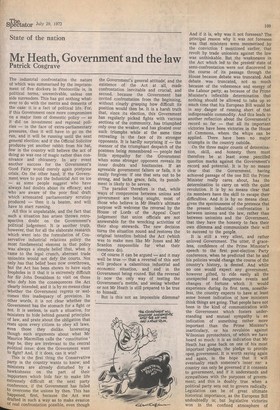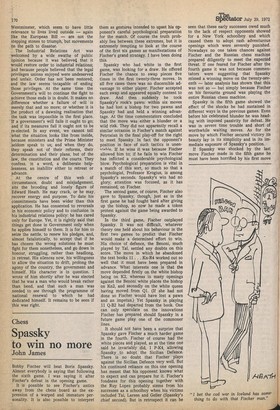State of the nation
Mr Heath, Government and the law
Patrick Cosgrave
The industrial confrontation the nature of which was summarised by the imprisonment of five dockers in Pentonville is, in political terms, unresolvable, unless one side surrenders. This has got nothing whatever to do with the merits and demerits of the case: it is a fact of political life. For, if this Government once more compromises on a major item of domestic policy — as it did on investment and regional policies — in the face of extra-parliamentary pressures, -then it will have to go on the run, and it will be running until the next general election: and if the Official Solicitor produces yet another rabbit from his hat, few in the country will believe the act of doing so was one of magic rather than connivance and chicanery. In any event another success for the Government's Good Fairy would merely again postpone crisis. On the other hand, if the Government were to put the Industrial Act on ice — as some people suggest who have always had doubts about its efficacy, and who are aware of the poor final draft which attenuated parliamentary scrutiny produced — then it is beaten, and will have to start running.
All this is unpalatable, and the fact that such a situation has arisen throws retrospective doubt on the Government's political judgement. It is another truth, however, that for all the elaborate research which went into the formulation of Conservative industrial relations policy the most fundamental element in that policy was always a simple belief that, when it came to the legal crunch, aberrant trade unionists would not defy the courts. Not only has that belief been now overthrown, but the Act has been shown to have such loopholes in it that it is extremely difficult for Sir John Donaldson to visit on those who defy him the consequences the Act clearly intended; and it is by no means clear Whether the Government regrets or welcomes this inadequacy of provision. In other words, it is not clear whether the Government has the stomach for a fight or not. It is useless, in such a situation, for ministers to hide behind general principles of law, and prate about the obligation that rests upon every citizen to obey all laws, even those they dislike. Interesting though such arguments about what Mr Maurice Macmillan calls the ' constitution ' may be, they are irrelevant to the central Political issue; does the Government want to fight? And, if it does, can it win?
This is the first thing the Conservative Party in the country wants to know; and ministers are already disturbed by a hawkishness on the part of their supporters which bids fair to make life extremely difficult at the next party conference, if the Government has failed to overcome the unions by then. This has happened, first, because the Act was drafted in such a way as to make evasion of real confrontation possible, even though the Government's general attitude; and the existence of the Act at all, made confrontation inevitable and crucial; and second, because the Government has invited confrontation from the beginning, without clearly grasping how difficult its position would then be. It is a harsh truth that, since its election, this Government has regularly picked fights with various sections of the community, has triumphed only over the weaker, and has gloated over such triumphs while at the same time retreating in the face of its stronger Opponents. It is hardly surprising if — the manner of the triumphant despatch of the postmen being remembered — people feel little sympathy for the Government when some stronger opponent reveals its inner doubts and hesitancies. If an agreeable government falters or fails, it is easily forgiven: if one that sets out to be strong, and lacks grace, fails, its punishment is likely to be severe.
The paradox therefore is that, while ways of compromise between unions and government are being sought, most of those who believe in Mr Heath's ultimate purpose will welcome the reversal by the House •of Lords of the Appeal Court judgement that union officials are not answerable for the wrecking activities of their shop stewards. The new decision turns the situation round and restores the original intention behind the Act (which was to make men like Mr Jones and Mr Scanlon responsible for what their members do).
Of course it can be argued — and it may well be true — that a reversal of this sort will produce a calamitous industrial and economic situation, and end in the Government being routed. But the reversal is now the only way of testing the Government's mettle, and seeing whether or not Mr Heath is still prepared to be true to himself.
But is this not an impossible dilemma? And if it is, why was it not foreseen? The principal reason why it was not foreseen was that ministers were mesmerised by the conviction I mentioned earlier, that revolt by trade unionists against the law was unthinkable. But the weaknesses in the Act which led to the present state of semi-confrontation were not discovered in the course of its passage through the House because debate was truncated. And debate was truncated, not so much because of the vehemence and energy of the Labour party, as because of the Prime Minister's inflexible determination that nothing should be allowed to take up so much time that his European Bill would be in any danger of running short of that indispensable commodity. And this leads to another reflection about the Government's record so far — that all its important victories have been victories in the House of Commons, where the whips can be applied. There have been no major triumphs in the country outside.
On the three major counts of determination, skill, and honesty there must therefore be at least some pencilled question marks against the Government's record and potential. It is by no means clear that the Government, having achieved passage of the one Bill the Prime Minister really cares, about, has the determination to carry on with the quiet revolution. It is by no means clear that its members have the skill to escape their difficulties. And it is by no means clear, given the speciousness of the pretence that the present industrial confrontation is between unions and the law, rather than between unionists and the Government, that they have the honesty to face their own dilemma and communicate their will to succeed to the people.
It is still a very silent, and rather unloved Government. The utter, if graceless, confidence of the Prime Minister's speech to the first post-election Party conference, when he predicted that he and his policies would change the course of the country's history, is dented. And while no one would expect any government, however gifted, to ride easily all the unexpected and dangerous events and changes of fortune which it would experience during its first term, nonetheless, the country expects to have at least some honest indication of how ministers think things are going. That people have not been in the kind of communication with the Government which fosters understanding and mutual sympathy is an indication of something rather more important than the Prime Minister's inarticulacy, or his revulsion against Wilsonian pyrotechnics, of which we have heard so much: it is an indication that Mr Heath has gone back on one of his most important pledges, the pledge to provide open government. It is worth saying again and again, in the hope that it will eventually reach someone's inner ear: a country can only be governed if it consents to government, and if it understands and sympathises with the purposes of government; and this is doubly true when a political party sets out to govern radically. Legislation can be of great ultimate historical importance, as the European Bill undoubtedly is; but legislative victories won in the confined atmosphere of Westminster, which seem to have little relevance to lives lived outside — again like the European Bill — are not the stepping stones to triumph, but movements on the path to disaster.
The Industrial Relations Act was welcomed by a wide swathe of public opinion because it was believed that it would restore order to industrial relations; and because people believed that the legal privileges unions enjoyed were undeserved and unfair. Order has not been restored; and the law seems incapable of ending those privileges. At the same time the Government's will to continue the fight to achieve those ends is in doubt. It makes no difference whether a failure of will is merely that and no more: or whether it is the product of a dawning realisation that the task was impossible in the first place. If a government's will fails it ought to go; and if its measures fail it ought not to be re-elected. In any event, we cannot tell what the situation looks like from inside, because ministers and the Prime Minister seldom speak to us; and when they do, they speak not of their reforms, their determination and their plans, but of the law, the constitution and the courts. They confess, in a word, a deliberate helplessness, an inability either to retreat or advance.
At the centre of this web of circumstance, doubt and misjudgement, sits the brooding and lonely figure of Edward Heath. He may crack, or he may recover energy and purpose. To date his commitments have been wider than this application. He has consented to reversals in his economic policy and to confusion in his industrial relations policy: he has cared only for Europe. Yet, it is rightly said that things get done in Government only when he applies himself to them. It is for him to seize the nettle, to renew his pledges, and, almost fatalistically, to accept that if he has chosen the wrong solutions he must fight for them nonetheless, and go down in honour, struggling, rather than headlong, in retreat. His silences now, his willingness to allow the situation to drift, prolong the agony of the country, the government and himself. His character is in question. I wrote of him shortly after he was elected that he was a man who would break rather than bend, and that such a man was needed to see through the programme of national renewal to which he had dedicated himself. It remains to be seen if this was right.









































 Previous page
Previous page